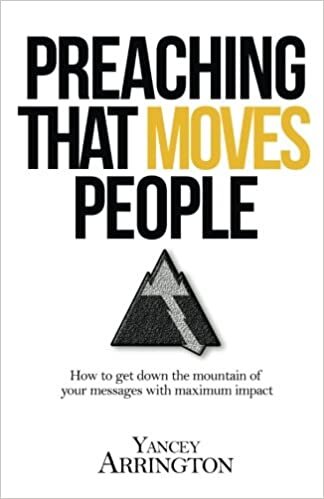Every now and then you read a book and find yourself saying over and over again “This is very helpful stuff right here!” I just finished a book that had this effect on me. Yancey Arrington, Teaching Pastor at Clear Creek Community Church in League City Texas, has given pastors a helpful tool his book Preaching that Moves People.
I’ve read quite a few volumes on the art and craft of preaching the Bible. In fact, it is quite a growing little section on my bookshelves. Many of them have a similar quality. They put forth a philosophy and methodology related to preaching and help you to accomplish the task in that way. In the tribes that take the Scriptures seriously, many of the works are focused on teaching truthful things in order to let the Bible speak. There are also works that focus primarily on communication and public speaking. Both of these bring immense value to a preacher’s toolbelt.
Preaching that Moves People takes a surprisingly different approach. Rather than focus on mere exegesis or communication techniques, Arrington’s book aims to bring focus to the oral event of preaching itself. Quite literally, it is a book about helping preaching to be less boring and more moving. If you want to connect with and hold the attention of an audience, this book has some very helpful tools for you.
Summary
The book has a simple structure using a simple memory device. It is as simple as remembering ABC. After some preliminary disclosures of his view of the Bible, of Jesus Christ, and his theological vision, Arrington structures the book with three primary sections:
Arrange for Tension
Build for Speed
Chart for bandwidth
Each of these sections of the book focuses on a different need within Arrington‘s preaching philosophy. In talking about arranging for tension, he leans upon the art of storytelling and building narratives. Many preachers will state the main idea of their sermon right at the beginning. Others will continue to tell you the exact structure of the sermon and the direction they are about to proceed. This structure, where you sort of tell everyone everything upfront, ruins any tension and drama in the movements of the sermon. Arrington’s claim is that the preacher needs to arrange his material in order to build tension as he moves toward the main idea of the sermon. He should not give away the store at the beginning! His introduction should create interest and tension as he leads into the body and main idea of the sermon.
The second section sets out a “Goldilocks zone” in terms of the pace that the sermon proceeds. Some preachers go too fast; some preachers go too slow. To talk about speed/pace in a sermon, Arrington introduces the concept of “getting down the mountain.” This is a metaphor he borrows from the world of alpine skiing. I must confess I have only been skiing once and it wasn’t the most pleasant experience. I did great on the novice and intermediate slopes but accidentally ended up on a black diamond and then ended up on my behind. Even so, I found this metaphor easy to understand and a helpful concept throughout the rest of the book.
Illustration from, Yancey Airington, Preaching that Moves People, 2018.
Preachers need to view their task as standing at the top of a ski slope about to take the journey of the sermon. There is a destination that the main idea of the the text should lead us to at the bottom, but there are many possible routes we could take to get there. Someone going “too fast” just bluntly shares a thought from the Bible without much investigation, depth, or rigor. It is sort of a straight line right down the mountain.
Illustration from, Yancey Airington, Preaching that Moves People, 2018.
Others, who go “too slow”, meander back and forth through many turns in a ponderous journey down the mountain. Many swing so far wide of the main idea of the biblical text being preached, and thereby wreck the sermon out of bounds and land in the trees. The preacher wants to land in a “just right” zone that balances pace with appropriate detail. The preacher wants to bring something of substance without getting lost in the woods of having too much content or too many ideas.
Illustration from, Yancey Airington, Preaching that Moves People, 2018.
Finally, and perhaps the most unique and surprising section of this book, was “C”, Chart for Bandwidth. Now I have an undergraduate degree in applied computer science and physics, so the word bandwidth provokes all sorts of images in my mind. What I found here was not some mathematically technical concepts, but rather a look at the emotional range found in a sermon. This section literally calls a preacher to look at where human emotions might travel while engaging with his sermon. Obviously human emotions have quite a range. There are high highs and low lows. Preaching that moves people will often travel in both. Arrington provides a very helpful tool in this book by providing a graph where a preacher can actually draw a chart of the emotional range his sermon. I told you, very helpful stuff!
The book concludes with a brief section on the individual preacher finding his own voice over time. This includes parts that encourage preachers to listen to others practitioners but not to idolize them. Far too often we see a sort of mimicry in preaching. Young pastors can attempt to become facsimiles of their favorite preachers they have on podcast which usually doesn’t turn out well. This section also shared different categories of preachers such as the professor, the author, the life coach, and the prophet. Arrington even describes these categories using the language of emotional bandwidth as well as providing some contemporary examples.
Strengths
Preaching that Moves People has many strengths so I will travel quickly here with them. First, the book was very easy to read. I found it to be clear, the concepts and illustrations illuminating, and the pacing of the work excellent. I read it in an afternoon with an eye to detail and was greatly helped. Second, the tone of the book, from beginning to end, is personal, pastoral, and coachy. It is the tone I love to hear when someone is teaching me something.
Finally, the illustrations and graphs are tremendous in this volume. The little graphics related to “getting down the mountain” and “charting bandwidth” each helped to cement the concepts in my mind. I also appreciate that Arrington took time at the beginning of the book to share with the reader where he is coming from theologically and biblically. This serves to not set off alarm bells for those who might be fearful of an excessive pragmatism. For the person who already has good skills in biblical exegesis and theological rigor, this is precisely the type of book needed. Dr. Arrington did a great job comforting those souls at the beginning of the book so that they would continue on to participate in his skiing class.
Weaknesses
To be quite frank, I found few weaknesses with this volume. It is simply fit for purpose and I will be recommending it often. If I could offer some improvement it would be along these lines. First, the book could expand the range of examples and paradigms outside of a middle-class suburban world. When describing members of a congregation and the jobs they performed, the book could be more inclusive for those who might be ministering in different contexts. Second, the examples given to describe four types/categories of preachers at the end of the book included eight white preachers as emblematic of the types. It might be more inviting to see additional examples from other traditions and backgrounds included there. Third, this volume obviously flows out from Arrington’s context where keeping the attention of regular church folk is paramount. However, It would be nice to see more about connecting and communicating to post Christendom contexts and non-Christians while faithfully preaching the Scripture. Finally, there still is not a Kindle version of this book out and I really want to buy one! So let’s hope the publisher gets that accomplished here soon.
These, however, are minor issues that I think would improve the work, but do not significantly distract from the book’s main purpose and message.
Conclusion
When this book first came out I scanned its contents and outline so I would understand the basic structure and flow. I did this because I saw it being recommended to church planters we were assessing in the Acts 29 Network. It took me a while to get around to a detailed reading of the book and I just want to say that it took me too long. Almost every preacher I know would be helped by Preaching that Moves People and I gladly recommend it to any who engage in the art and craft of biblical preaching.




























